A Conversation With Gerardo Naranjo and Stephanie Sigman (MISS BALA)
(Miss Bala is now available on DVD and at Amazon Instant through Fox World Cinema.)
When it premiered in the Un Certain Regard section at the 2011 Cannes Film Festival, Gerardo Naranjo’s Miss Bala caught everyone off-guard. Though his previous features Drama/Mex and I’m Gonna Explode addressed issues of class in modern Mexico, there remained a lighthearted stylistic flair that kept things bouncing along. From the very beginning of Miss Bala, it’s clear that Naranjo was determined to make an entirely different sort of movie this time around. Composed of long, carefully orchestrated takes, this slow-burn thriller charts the journey of a young woman, Laura (newcomer Stephanie Sigman), whose dream of winning a beauty pageant is complicated by the corrupt world around her. When she finds herself trapped in the madness herself, she’s unsure if she’s being treated as a pawn by the criminals or the police, or, more disturbingly, both. On the heels of a very successful theatrical release in Mexico, the filmmakers are eager to see if Miss Bala will spark similarly enthusiasm—and controversy—in the States. I met up with Naranjo and Sigman just days before the film was released in New York City to discuss their powerful film.
Hammer to Nail: The criminal activity in this movie felt particularly real to me, as opposed to being something overly flashy and spiced up. Did you do a lot of research for these elements or were you just using your imagination?
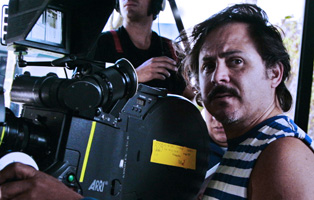 Gerardo Naranjo: No, no, my imagination wouldn’t go that far. We did a ton of research. And also not just research about how the criminals do it. We talked with victims, how they perceived these things happening, and they all say that when it happened to them, they felt like it was not happening. They said it was very quiet, it didn’t show. At times they are quiet and just walking, and at times they are very loud and shooting. So we [incorporated] this theory when we made the action sequences.
Gerardo Naranjo: No, no, my imagination wouldn’t go that far. We did a ton of research. And also not just research about how the criminals do it. We talked with victims, how they perceived these things happening, and they all say that when it happened to them, they felt like it was not happening. They said it was very quiet, it didn’t show. At times they are quiet and just walking, and at times they are very loud and shooting. So we [incorporated] this theory when we made the action sequences.
H2N: Did you know Gerardo’s films beforehand? How did the project first come to you?
Stephanie Sigman: Yeah, but I never thought he would do Miss Bala. Because I think it’s really different from his other films. I heard about the audition from my agent, and then I did two auditions and met Gerardo, and we started to talk. He was doing more auditions.
GN: Against her will.
SS: It wasn’t my movie! No, he was honest. He was like, “I’m still gonna look to see,” to make the right choice, I guess. But we started to talk and, well, we did the whole movie in four days on video as a rehearsal.
H2N: Really?
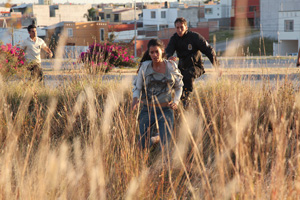 SS: Yeah, so we knew the choreography of the shots. Because the timing of every shot was very precise. But it was with no emotion, no acting. Just the choreography. And then we started to do it with the acting.
SS: Yeah, so we knew the choreography of the shots. Because the timing of every shot was very precise. But it was with no emotion, no acting. Just the choreography. And then we started to do it with the acting.
GN: We made a video board, as a way of casting. We went to the location and she was doing everything.
H2N: But that’s more than just helpful for casting. That camera rehearsal had to have helped immeasurably.
GN: Yeah, yeah, we were discovering the film. More than anything, we were discovering the language of the film. The producer was like, “Are you shitting me? You’re not gonna take close-ups in these places?” I would say, “No, it’s gonna work.” I mean, they wanted to trust me but they were like, “Come on. No coverage?” So when I showed them this footage, I think they said, “Oh, okay.”
H2N: How early on did you decide that you were going to use this long-take approach for the film? Because it is way different from your earlier stuff.
GN: I was pretty tired of the style of shooting that I had before, because I felt like I’d hit a spot, there was not much more to do with that. It was improvisation, the whole “playing with it,” and I wasn’t interested in that anymore. So I said, “Okay, I’m changing. And since I’m changing the subject, let’s also change the way [we shoot it].” And also, I felt I had that style in me. I said, “Let’s not improvise, let’s be very strong about knowing every shot and every frame,” and that’s why we story-boarded everything. It was a long process. In the previous films, the hell was to edit them, because there was eight hours, or six hours, of footage. It was terrible. And I felt that this time the hell was to prepare. We prepared so hard and we shot and when we assembled, we just put one shot after the other, and that was it.
H2N: Did it change at all in the edit or did you stick closely to the game plan?
 GN: We stuck to the plan. I think there were 140 shots and we included 130. So basically we just edited moments. I think we lost some of her point-of-view, the way some shots ended. So there was some editing, head and tails, but not much.
GN: We stuck to the plan. I think there were 140 shots and we included 130. So basically we just edited moments. I think we lost some of her point-of-view, the way some shots ended. So there was some editing, head and tails, but not much.
H2N: And like you said, that was a direct reaction to how you were making movies before, ending up with a mountain of footage in the editing room.
GN: Yeah. That was ridiculous. Everything I did before was just improvising. I really distrusted the script or any plan. We would just arrive on the set and start imagining it and it would be endless. For one scene, we would have ten different approaches. It was very schizophrenic, to put it mildly. It didn’t make sense many times. I felt that my intentions were lost in such a disorganized way of working. I wanted so much that I would have the scenes being played in so many different ways that at the end I felt I wasn’t even saying one thing. I really don’t wish to go back to that [type of filmmaking].
H2N: When shooting Miss Bala, were you placing limitations on how many takes you did? Like, five maximum?
GN: No, no, no. We arrived to take 20.
H2N: Really?
SS: Yeah. Some.
H2N: And did you watch playback to know that you had gotten it?
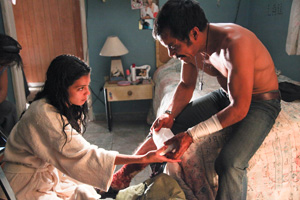 GN: Not really. It was not much about playback. It was about us knowing that we got it. And many times we said, “We didn’t get it, we didn’t get it.” No?
GN: Not really. It was not much about playback. It was about us knowing that we got it. And many times we said, “We didn’t get it, we didn’t get it.” No?
SS: Yeah, because they were such long takes that a lot of things have to [connect] together.
GN: The technical part was so hard. Like, I don’t think—and Stephanie will maybe tell me that I’m a liar—but we never repeated for acting. Or very few times.
SS: [SS laughs] We did, but…
GN: But most of the times it was not you saying, “I need another one.”
SS: No.
GN: Most of the time it was the camera guy saying, “I need another one!”
H2N: For you as an actor, one might think that unbroken takes are more akin to theater, which might enable you to get lost in the performance without having to stop-start-stop, but this was also some seriously technical orchestration going on, with focus marks…
SS: Oh, the marks!
H2N: Was there a point when you started to get comfortable with all of that stuff, or did it remain really tricky and hard throughout?
GN: It was always uncomfortable. [GN laughs]
SS: I mean, yeah, this part is uncomfortable, but there’s the other part of me as an actress, I guess it made my work easier that it was a long take because you don’t cut the emotion. Easier, but not! Because it’s like a contained emotion, so it’s not easy. I didn’t have previous experience, so I didn’t know if that was more difficult than cutting for an actor.
H2N: How about the physical aspect? It sounds weird to ask if it was “fun,” because I’m sure it was punishing. But you also had a lot to do, which sounds appealing in some kind of way. The fact that you’re climbing out of windows and jumping off of buildings…
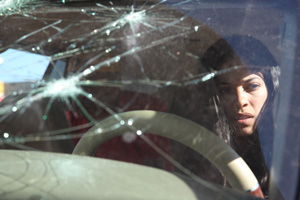 SS: You get used to it! It is fun but it’s also difficult. I hurt myself many times. Not seriously, but bruises and cuts. Things that you sometimes don’t feel with the adrenaline of the acting.
SS: You get used to it! It is fun but it’s also difficult. I hurt myself many times. Not seriously, but bruises and cuts. Things that you sometimes don’t feel with the adrenaline of the acting.
GN: Many times she was covered in blood…
SS: And I didn’t even notice that.
GN: …And we would scream to her, “Are you hurt?” And she was like, “I don’t know,” because the blood was in the action sequence from the other people. So she wouldn’t know which blood was her blood.
H2N: With this and I’m Gonna Explode, you’re making cinema that is tackling uncomfortable real-world issues. Especially with Miss Bala, were you worried in any way about making it, or did you feel like you were protected by being a “movie?”
GN: I think the basis of the film is the true fear I have for the people I love. Every time I say this. Let’s say we have a 50% fan base, and 50% that really don’t like the film and attack the movie. I keep saying, the movie was made because I don’t want to rely on just being lucky. I think we are relying on being lucky. Fifty thousand have been killed, and why I am so comfortable is just because I think some of us will be lucky. But that’s nonsense. So the origin of the film was fear. I was very fearful for what I was seeing, what I was witnessing, the ambience around me. Everyone was talking about it, like, “Don’t walk around the streets with money,” all these things. I said, “We should talk about it.” I felt it was a great way to start a project from the inside. Of course, I was looking for a metaphor, for a character that I could put what I feel in, and strangely it was a beauty queen that I saw in some news.
H2N: Obviously, you had to be excited to get the role: Gerardo’s very well respected and it’s a major lead role. But did you have any trepidation or worry about taking the part?
 SS: I think we worry about the reality that we are living in. I don’t think the movie is pointing a finger and nobody should be angry about [it]. I mean, if you don’t like the movie, that’s okay, but nobody should be angry about it. It doesn’t say that the government or these groups are guilty. I think it reflects some feeling that we have as a society. This kind of question made me worry, but, no, I wasn’t!
SS: I think we worry about the reality that we are living in. I don’t think the movie is pointing a finger and nobody should be angry about [it]. I mean, if you don’t like the movie, that’s okay, but nobody should be angry about it. It doesn’t say that the government or these groups are guilty. I think it reflects some feeling that we have as a society. This kind of question made me worry, but, no, I wasn’t!
H2N: Has it opened in Mexico?
GN: Yeah, it opened. I’m very proud of the promotion we did there, because most of the promotion was to show it to university people for free and to create a discussion and word-of-mouth from that discussion. The movie did really well. It was controversial. Some people hated it, which was great for us. We’re trying to recreate that a little bit here. I think the best thing that can happen to the film is to create another dialogue here in America about responsibility. Just to create a discussion, what America has to do if most of the money for these criminals comes from the US, and the weapons come from the US. So I hope to maybe raise a little bit of controversy.
H2N: Stephanie, you’ve been traveling the world with Gerardo to show this movie to people. As an actor, do you like watching it with crowds, and have you noticed different reactions in different countries?
SS: Yeah, some people just tell me that they hate the movie or they hate my acting…
H2N: No one would say that to your face, would they?!
SS: I have to deal with that. It’s okay. I guess I’m not that experienced, so I’m just trying to learn how to react to these things. I think it’s scarier to watch my interviews.
GN: Oh, really?!
SS: Yeah, I don’t like to watch myself.
H2N: Gerardo, do you plan to keep making films that are pure shots of cinematic adrenaline but that also deal with controversial modern issues like class and corruption?
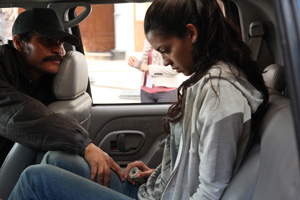 GN: I don’t think so. I think the subject of Mexico’s crime and the state of justice, I really don’t want to touch again. I think it’s great and the movies have done great, they’ve really traveled. I guess I’ve gotten a little bit out of my comfort zone. I never imagined having a movie that would have this kind of profile. I was much more comfortable making art house movies. Not that I want to go back to making the type of movies I was doing, but this incendiary subject is something I don’t want to do again. Everything I had to say, I said it. The thing that drives me in filmmaking is the challenge; whatever is a challenge, something I don’t know how to do. Like, I’m not that eager to make any more action sequences. People like the action sequences in this movie, but I refuse to become an “action film director.” [H2N and SS laugh]
GN: I don’t think so. I think the subject of Mexico’s crime and the state of justice, I really don’t want to touch again. I think it’s great and the movies have done great, they’ve really traveled. I guess I’ve gotten a little bit out of my comfort zone. I never imagined having a movie that would have this kind of profile. I was much more comfortable making art house movies. Not that I want to go back to making the type of movies I was doing, but this incendiary subject is something I don’t want to do again. Everything I had to say, I said it. The thing that drives me in filmmaking is the challenge; whatever is a challenge, something I don’t know how to do. Like, I’m not that eager to make any more action sequences. People like the action sequences in this movie, but I refuse to become an “action film director.” [H2N and SS laugh]
H2N: Correct me if I’m wrong, but it seems like each of your film’s production scales have gotten bigger and bigger up to now.
GN: Yeah, and that has to stop eventually. It’s not my dream to arrive at a zillion dollar film. I think that whatever makes for a decent film is something I’m interested in. Obviously, the previous films I did, there was no money for catering, there was no money for nothing, so I do aspire to pay people and have them living decently. But more than that, I don’t aspire to have the big trailers. Because I truly think that gets in the way of making a good film.
— Michael Tully








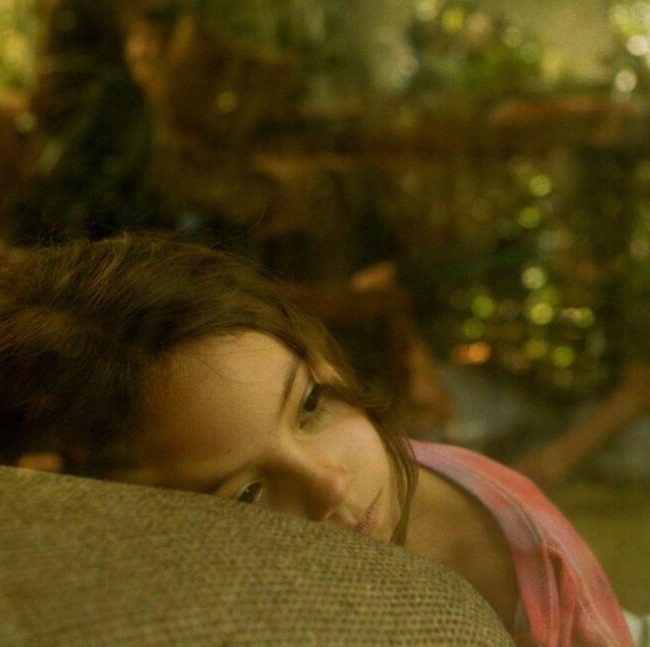
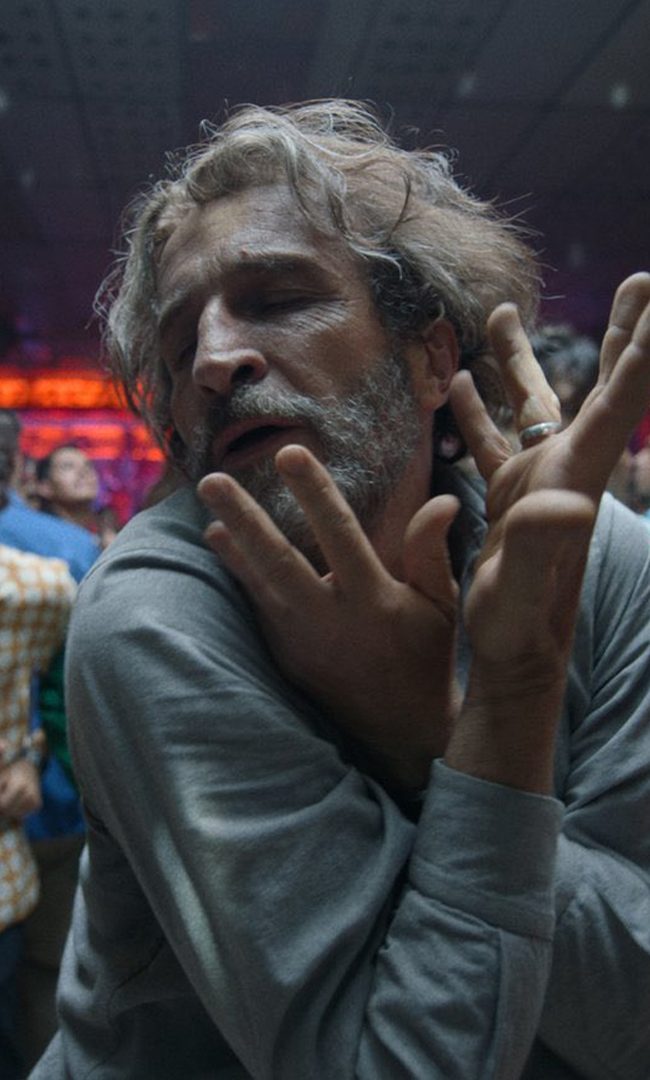


Pingback: HOME VIDEO PICKS – Hammer to Nail